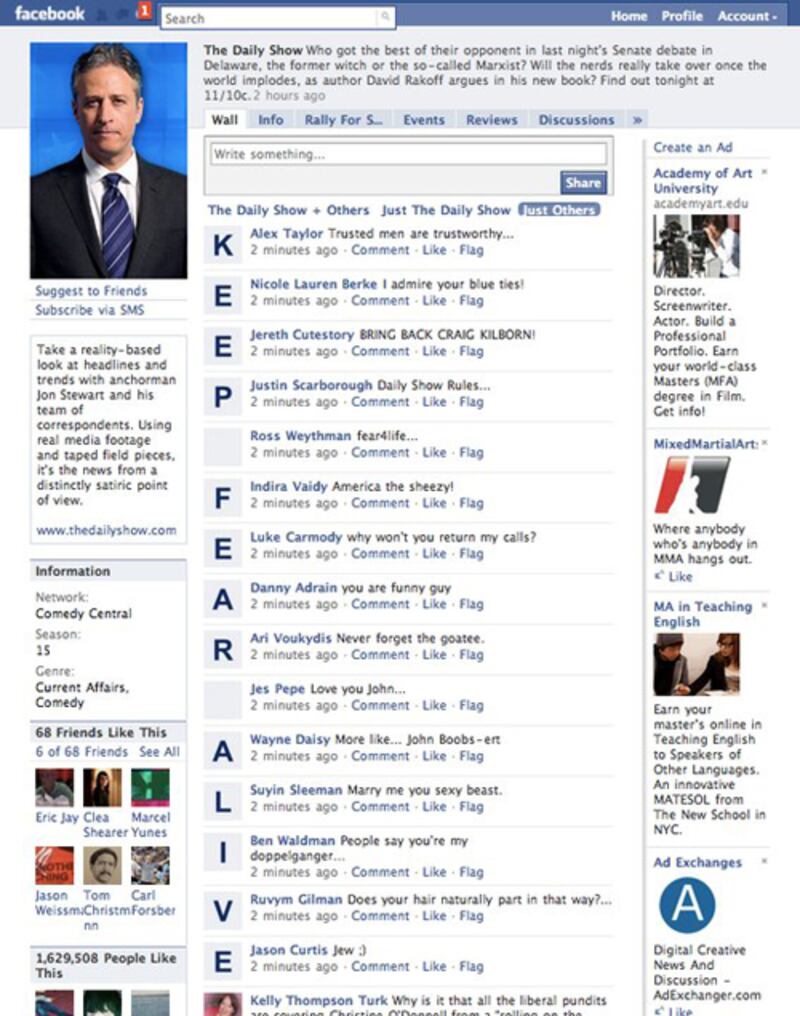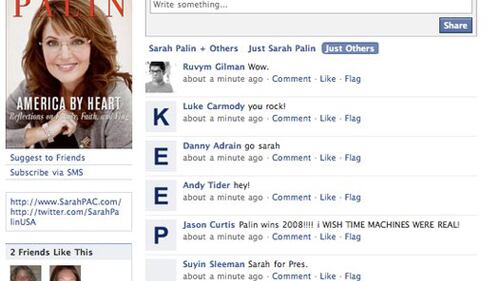Keep Fear Alive! The inside story of a group of rogue ad execs who hijacked Sarah Palin and Glenn Beck’s Facebook pages—and how you can, too.
The vertical message that ran down the left side on Glenn Beck's Facebook page the night of October 14 read clear as that evening's sky: "K-E-E-P F-E-A-R A-L-I-V-E." It was a reference to Stephen Colbert’s March to Keep Fear Alive, a gathering organized in faux-competition with this weekend’s Rally to Restore Sanity, headlined by Jon Stewart.
Minutes after the first message appeared, the same letters, in the same order, began turning up on the fan pages of FOX News', Sarah Palin, and hilariously, Justin Bieber. Each letter was displayed in the space where a profile picture would normally be, next to a posted comment. As each Facebook user posted their comments in the right order, the message came to life.
Seeing the unauthorized messages pop up on their feeds, the page administrators began furiously scrubbing the pages. Palin's message lasted almost an hour. Beck's was gone in just one minute.
By the end of the hour, the pranksters had hit the conservative network and its two high-profile commentators, all to varying degrees of success. They hit The Daily Show's page too, willful participants in the faux-feud between the two Comedy Central hosts.
So who were the pranksters behind the Facebook hijackings? The Daily Beast reveals who they were, why they did it, and how they momentarily hijacked the pages of some of Facebook’s most high-profile users.
Meet Jeff Greenspan, a creative prankster working at a New York City ad firm, who, with two colleagues—Chris Baker and Danny Adrain—invented the practice they’ve dubbed " letterbombing," defining it as "a subversive way to deliver a message anywhere on Facebook."
"Congratulations," reads Letterbombing.com in its welcoming headline, "You're about to become an Internet vandal."
The scheme was initially hatched by Greenspan as a viral idea that could potentially be used to promote a client’s product. The creative director hadn't seen anybody using their Facebook profile pictures as a "collaborative game piece," he says, and thought that if you got people to change their profile pictures to letters, you could vertically spell out that client's tagline on its own Facebook page.
The idea never gained much traction as a client project, so Greenspan took it outside the halls of the agency and decided to use the concept for his own amusement. He recruited Baker and Adrain, and, offering up his own page for the experiment, declared that anyone who succeeded in posting a vertical message on his page with profile pictures would get a free dinner. But his new teammates had another idea— why not "bomb" the pages of famous people?
“Congratulations,” reads Letterbombing.com in its welcoming headline, “You’re about to become an Internet vandal.”

It was then the plan was hatched, and the practice of “letterbombing” was born.
First they registered the URL. It was available, much to their surprise. Then Adrain created and posted the profile letters, which are hosted on the site as a .zip file, still available for anyone to use.
"Now who should we bomb?" they asked themselves, zeroing in on those with whom they had "an ideological difference with."
"Glenn Beck was an easy target. Sarah Palin was an easy target. Fox News was an easy target," he says. But they didn't want to just write something stupid, like "Glenn Beck Sucks," or "Sarah Palin Is the Devil."

What about "Keep Fear Alive"?
The idea, says the self-admitted Colbert Report and Daily Show fan, came to be because even if you aren't familiar with this weekend's Colbert rally, "it's still really funny to make it look like Glenn Beck's followers or Sarah Palin's followers are saying [Keep Fear Alive]. So we thought it worked on a couple of levels."
The night of the hijackings, they threw a party, inviting a handful of friends and coworkers. They poured some wine and beer, doled out the letters, and with WiFi flowing from a newly purchased Airport Extreme, the team of pranksters got to work.
All in all, they heard limited negative feedback. One commenter asked, “Is this how liberals hope to change the world?” Stephen Colbert’s team later saw the video and told USA Today that they “do not ‘condone’ vandalism or name-calling.”
To limit the “feedback” from Beck fans, they were careful to change their privacy settings to “Friends of Friends” so that nobody would find and post their info. “All you need is one Beck person to put your name out there…" Greenspan offered.
Aside from the previously mentioned targets, they hit Andrew Cuomo too, hoping to spell out “The Rent Is Too Damn High,” but one Cuomo Facebook fan not in on the joke disrupted the flow of the letters. They tried reaching out to ask if the disrupter would delete his post for a few minutes, but he balked. "Absolutely not!" Greenspan said was the Cuomo poster's reaction. "Who's asking me to delete my post on a political Facebook page?!"
Letterbombing has since been used to push other messages on the pages of high-profile Facebook users. BBDO, the ad agency where the three letterbombers are employed, later co-opted the practice for a pro-bono client.
Four days after the initial push, a similar-looking message popped up on Governor David Paterson's Facebook page. It read, "S-I-G-N T-H-E A-U-T-I-S-M B-I-L-L."
In a statement sent in by an anonymous tipster later that day, the pranksters explained they had hijacked the governor's page hoping to urge him to sign a bill requiring insurers to fully cover treatment for autism disorders. (He later vetoed it, citing budgetary concerns.)
Greenspan confirmed these were people at his agency, too, as first reported in Ad Rants, all working on behalf of an autism-related support group.
He's since noticed his tactic has spread across the pond. A radio station in Brussels letterbombed a rival's page in the Netherlands, a digital-marketing company letterbombed their own, and a radio station in Europe did what they think was a letterbomb in changing their profile picture to their call letters, but was an act some users on Twitter have called a "letterbomb fail."

The Letterbombers hope that people will take their idea and roll with it—spelling Happy Birthday on their friends pages, for instance. As for rules of the game, Greenspan notes that once you’ve been the “F,” you should always stay an “F,” so it doesn’t mess up your previous messages. For 2012, Greenspan’s hoping to create LetterObama, where the letterbomb can be used for the president’s reelection efforts.
Where there are Facebook pages, there will always be pranksters. As one admin wrote on a page they were hijacking, “Protecting from trolls is a full-time job.”
“Well, you have to admit it’s pretty funny,” read another, echoing the letterbombers’ thoughts exactly.
Brian Ries is tech and social media editor at The Daily Beast. He lives in Brooklyn.




